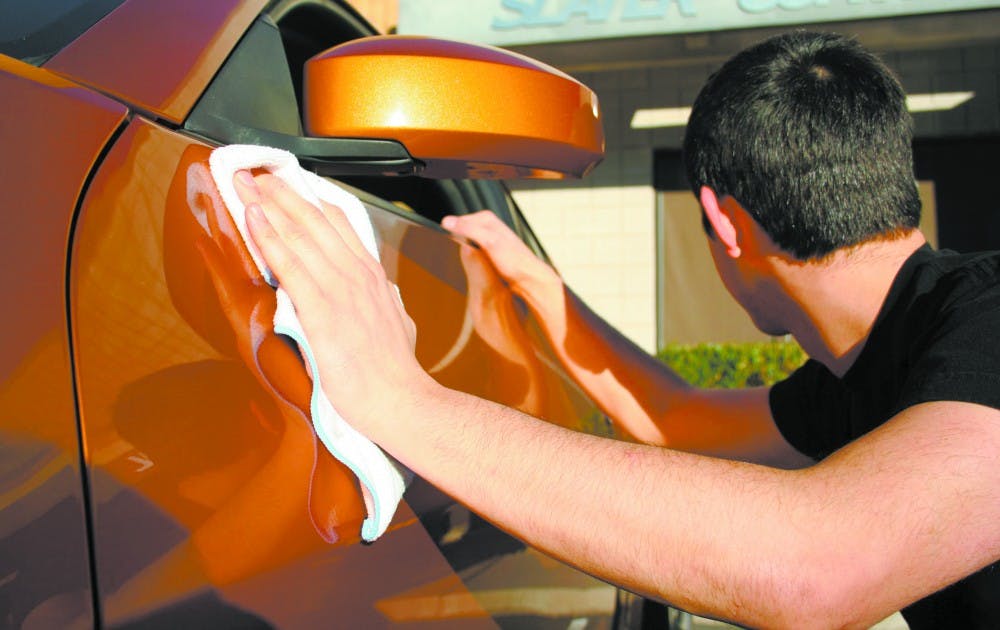For many, Valentine’s Day is an opportunity to show that special someone how they truly feel.
But a study conducted by ASU researchers reveals that special “someone” might actually be a special “something.”
The study, published in the January issue of the Journal of Consumer Research, shows that a person can have feelings of love for material things, not just other people.
“I think we’ve been taught that while people can like things, love is something that is reserved for the feelings that one person can have for another,” marketing professor and principal investigator John Lastovicka said. “However, our research shows that is not the case.”
Lastovicka and former doctoral business student Nancy Sirianni started their study on “material possession love” in December 2006.
They originally began the study looking for “frugal materialism” by interviewing people at car shows and owners of classic cars. It wasn’t long before they noticed the strong emotions their interviewees had for their vehicles.
Lastovicka and Sirianni set out to conduct hundreds of interviews. Over the course of three years they found several cases of people expressing real love toward their possessions.
“Some even teared up when asked about how much their car meant to them,” said Sirianni, who now works at Texas Christian University in Fort Worth, Texas.
Sirianni said the study went beyond spending and materialism and was more about real human emotions.
“John and I knew we were on to something important, and the project then became about material possession love,” Sirianni said.
Lastovicka and Sirianni used three key emotions to determine if those interviewed were expressing true humanistic feelings toward their possessions: passion, intimacy and commitment.
Passion is described as the urge or drive to be with the object, Sirianni said.
“They were petting their cars, even caressing them … they couldn’t keep their hands off of them, quite actually,” she said.
Intimacy is described as truly knowing the beloved possession, whether that be physically through the vehicle’s paint chips, angles and corners, or intellectually through the vehicle identification number and history of the make and model.
Commitment is described as wanting to keep the car forever, Sirianni said.
“One [interviewee] even imagined that he would only sell his car if he were to learn that he had a terminal disease,” Sirianni said.
Both qualitative and quantitative approaches were used in the study. Lastovicka and Sirianni used a qualitative approach by conducting long interviews at car shows in and around Phoenix.
The two researchers developed survey questions to measure the qualities that comprise love. They then used a quantitative approach by testing the survey questions with members of online forums and ASU students.
“We found compelling evidence,” Sirianni said. “Those in love spent six times more on their cars than those not in love.”
Lastovicka and Sirianni wanted to express that feeling of love toward a possession is not unhealthy and such harsh judgment is a “problem.”
Sirianni said these emotions are very real to them and that demonstrating these emotions is OK.
“I love my car; she’s my baby,” said business management freshman Preston Lindsey, who named his car “Shasta.”
Lindsey said he would cry if he were to get into an accident while driving his car.
“When I was home I would wash it once or twice a week,” Lindsey said.
He said he spent about $4,000 to enhance the vehicle. He now has a license plate with his name on it and is still driving the car.
The study concludes that people can feel true emotions toward their possessions, whether a car, firearm, motorcycle or any other prized item.
A big challenge is accepting that people can actually love their possessions, Sirianni said. Many people, upon first learning about the project, seemed to judge these individuals as having “non-healthy” behavior.
“These people are just like you and me, in fact, they are you and me,” Sirianni said.
Reach the reporter at tiffany.ngo@asu.edu





